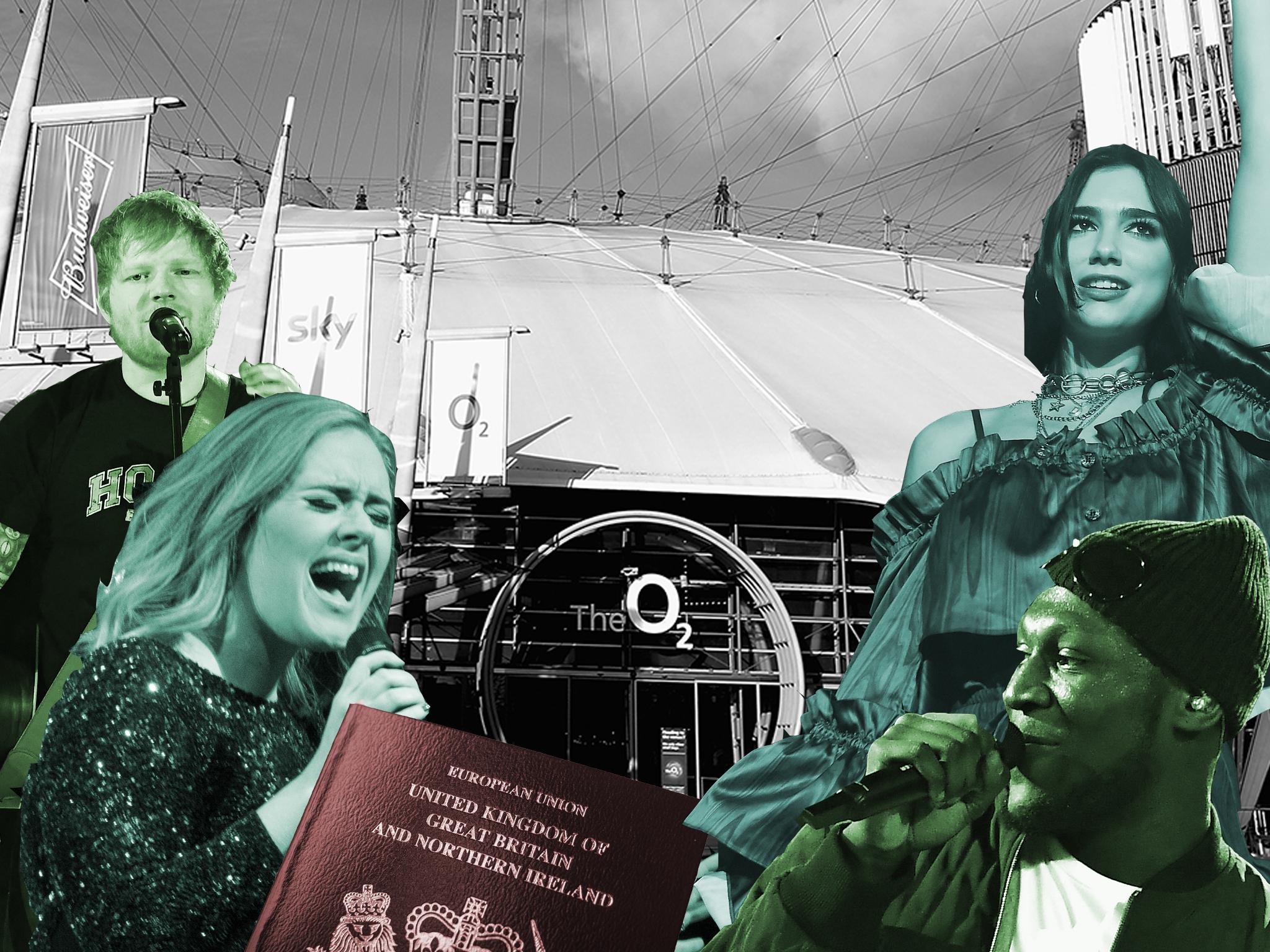How Brexit will affect the UK music industry, from touring to copyright
As the music industry celebrates record revenues nationally and abroad – with homegrown artists like Ed Sheeran, Adele and Stormzy ranked among the top in the world – will Brexit undo it all, asks Roisin O'Connor


Your support helps us to tell the story
From reproductive rights to climate change to Big Tech, The Independent is on the ground when the story is developing. Whether it's investigating the financials of Elon Musk's pro-Trump PAC or producing our latest documentary, 'The A Word', which shines a light on the American women fighting for reproductive rights, we know how important it is to parse out the facts from the messaging.
At such a critical moment in US history, we need reporters on the ground. Your donation allows us to keep sending journalists to speak to both sides of the story.
The Independent is trusted by Americans across the entire political spectrum. And unlike many other quality news outlets, we choose not to lock Americans out of our reporting and analysis with paywalls. We believe quality journalism should be available to everyone, paid for by those who can afford it.
Your support makes all the difference.The British music industry is experiencing an unprecedented boom, with artists such as Ed Sheeran, Adele, Stormzy, Dua Lipa and Rag’n’Bone Man achieving record-breaking revenues at home and abroad last year. One in eight albums purchased around the world in 2017 was by a UK artist, but with Brexit looming, the industry is growing increasingly alarmed at the lack of any clear plan to continue this success once the UK leaves the EU – with sales and touring both likely to suffer.
In 2017, the UK music industry was worth a record £4.5bn. Export revenues of British music grew by 7 per cent to a new high of £2.6bn. Sheeran topped the international bestseller list with his record-obliterating third album Divide, while Rag’n’Bone Man – at the time a relative newcomer – placed fourth with his debut album, Human.
Live events accounted for £1bn of revenue, thanks to major world tours by the Rolling Stones, Coldplay and Sir Paul McCartney – five of the top 10 most successful world tours were from UK acts. The O2 in London was the world’s most popular arena that year.
But there are growing fears that Brexit could scupper this success. Artists such as Rod Stewart have been vocal in their wish to have a second referendum – a people’s vote – on Brexit. “I think the people have been fooled,” he said in a recent interview with The Independent.
“They’ve been lied to… whether we drop out of the customs union or whatever, I think it all needs to be rescheduled and we should have a new referendum because people are fed up with it.”
Industry bodies have also been issuing stark warnings for months about the potential effects of a bad Brexit deal on the UK music scene, and have suggested that it be pushed back in order to secure a proper, well thought-out deal that will nurture, rather than neglect, the UK’s flourishing music scene.
Geoff Taylor, chief executive of the British Phonographic Industry (BPI), says that a “strong” agreement with the EU is required to ensure Brexit does not negatively impact Britain’s musical imports and exports.
“Music can help to showcase what is exciting about the UK as we forge new trading relationships,” he says, “but only if our government supports us by ensuring a strong Brexit deal that enables artists to tour freely, robustly protects music rights, and prevents physical music products being impeded in transit.”
Independent record labels also have cause for concern. Earlier this year, the UK-based Beggars Group, which houses Mercury Prize-winning artist Sampha along with labels Rough Trade, XL Recordings (home to Radiohead and Adele) and 4AD, issued a warning over the effect Brexit could have on emerging artists – specifically with regards to restrictions on travel for staff and artists, tariff costs, duties and withholding taxes on royalties.
“Revenues from the EU are a critical element of the business,” its directors said in a recent statement. “Therefore, it is of some concern that the arrival of Brexit may hold back further growth.”
Chris Scott, general manager of Communion Music – an independent music company including a label that houses artists such as Catfish and the Bottlemen, Lucy Rose and Tamino – says it is "very hard to know exactly what Brexit is actually going to look like for us".
"But our artists have international audiences and are based all over the world," he points out, "and it’s difficult to imagine Brexit doing anything other than making commerce, communication and travel between borders much more difficult.”
Michael Dugher, CEO of UK Music, says there are three main causes of concern for the industry after Brexit – first of which is the ongoing uncertainty over what is being done to ensure a smooth transition period; something the industry is keeping “a close eye on”, he tells The Independent. “We’re taking a vigilant approach.”
The second is copyright, although PRS, the main royalty collection society in the UK, expects current protection on sound recordings to remain the same – unless someone presents an argument that it is damaging to the economy. UK music copyright law changed in recent years to fall in line with an EU directive that was approved in 2011, so protection on sound recordings increased from 50 years to 70 years.
Issues that could affect touring are likely to be the biggest issue, particularly for new acts trying to break through. Local musicians, trade bodies and other organisations would all have to deal with extra tariffs, duties and tax withholdings on royalty payments, which translates roughly to: a lot of paperwork, additional costs and headaches for the artists and their teams. Many artists are already feeling the effects.
In July, the organiser of the world music festival Womad said artists had “given up” trying to visit the UK to perform because entering the country had become “difficult and humiliating” since the Brexit referendum.
Chris Smith said the impact of the UK visa process on foreign musicians had made it more difficult to attract performers to this year’s festival – with artists accepting the invitation to take part, only to withdraw after researching the visa process.
“We’ve had situations where, say, an African artist has been due to come who plays a particularly rare instrument, and we’ll be asked: ‘Can’t you find someone in the UK who plays that instrument?’, which is absurd,” he told the Radio Times.
“The saddest thing is always the number of artists struggling to get visas to come and perform. What we’re seeing this year is unexpected and even more depressing, which is artists saying we’re just not going to tackle the immigration system, saying it’s too difficult and too expensive, and it’s humiliating.”
A number of famous composers, singers and producers signed a letter by Bob Geldof that spoke of how the UK could become a “cultural jail” if faced with the prospect of reduced royalties and artists who are not able to cross borders with the ease they do now.
“We are about to make a very serious mistake regarding our giant industry and the vast pool of yet undiscovered genius that lives on this little island,” the letter reads.
“It is the much-mocked freedom of movement that so effortlessly allows our troubadours, our cultural warriors, to wander Europe and speak of us to a world that cannot get enough of them and which generates countless billions for our threatened institutions.”
The current UK permit system for non-EU performers flying in and out for individual performances, which is called the “permitted paid engagement” visa, is only an option for artists who can show authorities they have an international reputation. It does not accommodate rising stars who cannot offer proof in the form of press cuttings.
The Musicians Union is campaigning for the government to guarantee a simple, cheap and admin-light EU touring visa for musicians and performers – a petition for which has been signed by over 15,000 people. This option is preferable over the reintroduction of the carnet – a legal document that shows you can temporarily move goods, such as musical instruments, outside the UK.
Different countries have different regulations, but the ATA carnet that covers 70 countries currently costs £325.96 plus a deposit. That may not sound like much for a major artist like Ed Sheeran, but for a band just starting out, that’s more than they’re likely to earn in a week of gigs in the UK. It’s also a massive headache for musicians on tour who have to deal with border officials going through every single one of their cases, to make sure they’re not bringing any more or less than what is stated in the carnet.
“Travelling around Europe is the biggest concern because the least amount of progress has been made on this issue,” Dugher says, although he adds that the Department for Digital, Culture, Media and Sport (DCMS) has been “incredibly supportive” in the ongoing work to support the music industry post-Brexit.
He recalls a widely shared quote by his predecessor and former Undertones frontman Feargal Sharkey, who spoke of how he’d watched road crew “on their hands and knees at the back of the stage” picking up broken drumsticks, and curling guitar strings into little packets.
“Because the rules were, if you said on the paperwork you’d taken 400 drumsticks out of the country you’d better bring them all back – even if they were all broken,” Sharkey explains. “I have stood and watched them steam with fury while some belligerent bureaucrat made them unload a 40ft artic trailer to count the number of speakers. Do we really want to go back to that?”
“That sort of absurd nonsense could be staring us in the face,” Dugher says, “and make touring potentially unviable. The music industry contributes £4.5bn to the economy. Brexit represents an existential threat to that success unless we protect the ability for artists and musicians to travel freely between the UK and the EU.”

“The government must ensure our musicians are able to tour freely, even after we leave the EU,” Taylor agrees. “We should also make the UK the best place to invest in new content by forging an online environment that is safe for consumers and where illegal sites cannot flourish.”
In an interview with the BBC, PRS’s chief executive Robert Ashcroft sounded slightly more optimistic, although he was concerned about the potential impact of Brexit on PRS staffing levels. “Eleven per cent of our employees come from countries other than the UK,” he said. “We operate daily in 13 languages. We need the prime minister to give assurances that the people resident and working here can stay.”
Alex Beard, chief executive of the Royal Opera House, says that it is “vital” to a creative sector which is “the envy of the world, that this country remains open and welcoming to the most talented and creative global thinkers and artists.
“The creative industries are the UK’s fastest-growing sector and without a streamlined mechanism for welcoming overseas artists and arts workers, the UK’s reputation as a hotbed of talent, internationalism and openness is under threat – along with the vitality of the sector and indeed the economy as a whole.
“As we reach crunch point in negotiations, we urge decision makers to bear this strongly in mind and ensure that a quick and efficient permit system, an established right to remain for EU nationals as well as easy access for the world’s highly skilled creative industries are in place so that we can continue to contribute to the economic and cultural fabric of the UK and the world.”
Join our commenting forum
Join thought-provoking conversations, follow other Independent readers and see their replies
Comments